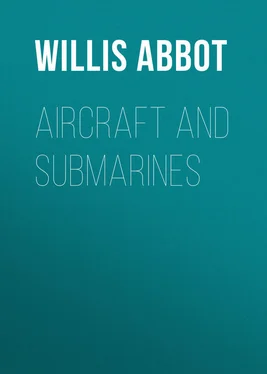Willis Abbot - Aircraft and Submarines
Здесь есть возможность читать онлайн «Willis Abbot - Aircraft and Submarines» — ознакомительный отрывок электронной книги совершенно бесплатно, а после прочтения отрывка купить полную версию. В некоторых случаях можно слушать аудио, скачать через торрент в формате fb2 и присутствует краткое содержание. Жанр: foreign_antique, foreign_prose, на английском языке. Описание произведения, (предисловие) а так же отзывы посетителей доступны на портале библиотеки ЛибКат.
- Название:Aircraft and Submarines
- Автор:
- Жанр:
- Год:неизвестен
- ISBN:нет данных
- Рейтинг книги:4 / 5. Голосов: 1
-
Избранное:Добавить в избранное
- Отзывы:
-
Ваша оценка:
- 80
- 1
- 2
- 3
- 4
- 5
Aircraft and Submarines: краткое содержание, описание и аннотация
Предлагаем к чтению аннотацию, описание, краткое содержание или предисловие (зависит от того, что написал сам автор книги «Aircraft and Submarines»). Если вы не нашли необходимую информацию о книге — напишите в комментариях, мы постараемся отыскать её.
Aircraft and Submarines — читать онлайн ознакомительный отрывок
Ниже представлен текст книги, разбитый по страницам. Система сохранения места последней прочитанной страницы, позволяет с удобством читать онлайн бесплатно книгу «Aircraft and Submarines», без необходимости каждый раз заново искать на чём Вы остановились. Поставьте закладку, и сможете в любой момент перейти на страницу, на которой закончили чтение.
Интервал:
Закладка:
It was a beaten army that plodded back to the line of the Marne. Its retreat at times narrowly approached a rout. But the army was not crushed, annihilated. It remained a coherent, serviceable part of the allied line in the successful action speedily fought along the Marne. But had it not been for the presence of the airmen the British expeditionary force would have been wiped out then and there.
The battle of Mons gave the soldiers a legend which still persists – that of the ghostly English bowmen of the time of Edward the Black Prince who came back from their graves to save that field for England and for France. Thousands of simple souls believe that legend to-day. But it is no whit more unbelievable than the story of an army saved by a handful of men flying thousands of feet above the field would have been had it been told of a battle in our Civil War. The world has believed in ghosts for centuries and the Archers of Mons are the legitimate successors of the Great Twin Brethren at the Battle of Lake Regillus. But Cæsar, Napoleon, perhaps the elder von Moltke himself would have scoffed at the idea that men could turn themselves into birds to spy out the enemy's dispositions and save a sorely menaced army.
When this war has passed into history it will be recognized that its greatest contributions to military science have been the development and the use of aircraft and submarines. There have, of course, been other features in the method of waging war which have been novel either in themselves, or in the gigantic scale upon which they have been employed. There is, for example, nothing new about trench warfare. The American who desires to satisfy himself about that need only to visit the Military Park at Vicksburg, or the country about Petersburg or Richmond, to recognize that even fifty years ago our soldiers understood the art of sheltering themselves from bullet and shrapnel in the bosom of Mother Earth. The trench warfare in Flanders, the Argonne, and around Verdun has been novel only in the degree to which it has been developed and perfected. Concrete-lined trenches, with spacious and well-furnished bomb-proofs, with phonographs, printing presses, and occasional dramatic performances for lightening the soldiers' lot present an impressive elaboration of the muddy ditches of Virginia and Mississippi. Yet after all the boys of Grant and Lee had the essentials of trench warfare well in mind half a century before Germany, France, and England came to grips on the long line from the North Sea to the Vosges.
Asphyxiating gas, whether liberated from a shell, or released along a trench front to roll slowly down before a wind upon its defenders, was a novelty of this war. But in some degree it was merely a development of the "stinkpot" which the Chinese have employed for years. So too the tear-bomb, or lachrymatory bomb, which painfully irritated the eyes of all in its neighbourhood when it burst, filling them with tears and making the soldiers practically helpless in the presence of a swift attack. These two weapons of offence, and particularly the first, because of the frightful and long-continuing agony it inflicts upon its victims, fascinated the observer, and awakened the bitter protests of those who held that an issue at war might be determined by civilized nations without recourse to engines of death and anguish more barbaric than any known to the red Indians, or the most savage tribes of Asia. Neither of these devices, nor for that matter the cognate one of fire spurted like a liquid from a hose upon a shrinking enemy, can be shown to have had any appreciable effect upon the fortunes of any great battle. Each, as soon as employed by any one belligerent, was quickly seized by the adversary, and the respiratory mask followed fast upon the appearance of the chlorine gas. Whatever the outcome of the gigantic conflict may be, no one will claim that any of these devices had contributed greatly to the result.
But the airplane revolutionized warfare on land. The submarine has made an almost equal revolution in naval warfare.
Had the airplane been known in the days of our Civil War some of its most picturesque figures would have never risen to eminence or at least would have had to win their places in history by efforts of an entirely different sort. There is no place left in modern military tactics for the dashing cavalry scout of the type of Sheridan, Custer, Fitz Lee, or Forrest. The airplane, soaring high above the lines of the enemy, brings back to headquarters in a few hours information that in the old times took a detachment of cavalry days to gather. The "screen of cavalry" that in bygone campaigns commanders used to mask their movements no longer screens nor masks. A general moves with perfect knowledge that his enemy's aircraft will report to their headquarters his roads, his strength, and his probable destination as soon as his vanguard is off. During the Federal advance upon Richmond, Stonewall Jackson, most brilliant of the generals of that war, repeatedly slipped away from the Federal front, away from the spot where the Federal commanders confidently supposed him to be, and was found days later in the Valley of the Shenandoah, threatening Washington or menacing the Union rear and its communications. The war was definitely prolonged by this Confederate dash and elusiveness – none of which would have been possible had the Union forces possessed an aviation corps.
It is yet to be shown conclusively that as offensive engines aircraft have any great value. The tendency of the military authorities of every side to minimize the damage they have suffered makes any positive conclusion on this subject difficult and dangerous at this moment. The airplane by day or the Zeppelin by night appears swiftly and mysteriously, drops its bombs from a height of several thousand feet, and takes its certain flight through the boundless sky to safety. The aggressor cannot tell whether his bombs have found a fitting target. He reports flaming buildings left behind him, but whether they are munition factories, theatres, or primary schools filled with little children he cannot tell. Nor does he know how quickly the flames were extinguished, or the amount of damage done. The British boast of successful air raids upon Cuxhaven, Zeebrugge, Essen, and Friedrichshaven. But if we take German official reports we must be convinced that the damage done was negligible in its relation to the progress of the war. In their turn the Germans brag mightily of the deeds of their Zeppelins over London, and smaller British towns. But the sum and substance of their accomplishment, according to the British reports, has been the slaughter and mutilation of a number of civilians – mostly women and children – and the bloody destruction of many humble working-class homes.
At this writing, December, 1917, it is not recorded that any battleship, munition factory, any headquarters, great government building, or fortress has been destroyed or seriously injured by the activities of aircraft of either type. This lack of precise information may be due to the censor rather than to any lack of great deeds on the part of airmen. We do know of successful attacks on submarines, though the military authorities are chary about giving out the facts. But as scouts, messengers, and guides for hidden batteries attacking unseen targets, aviators have compelled the rewriting of the rules of military strategy. About this time, however, it became apparent that the belligerents intended to develop the battleplanes. Particularly was this true of the Allies. The great measure of success won by the German submarines and the apparent impossibility of coping adequately with those weapons of death once they had reached the open sea, led the British and the Americans to consider the possibility of destroying them in their bases and destroying the bases as well. But Kiel and Wilhelmshaven were too heavily defended to make an attack by sea seem at all practicable. The lesser ports of Zeebrugge and Ostend had been successfully raided from the air and made practically useless as submarine bases. Discussion therefore was strong of making like raids with heavier machines carrying heavier guns and dropping more destructive bombs upon the two chief lurking places of the submarines. While no conclusion had been reached as to this strategy at the time of the publication of this book, both nations were busy building larger aircraft probably for use in such an attack.
Читать дальшеИнтервал:
Закладка:
Похожие книги на «Aircraft and Submarines»
Представляем Вашему вниманию похожие книги на «Aircraft and Submarines» списком для выбора. Мы отобрали схожую по названию и смыслу литературу в надежде предоставить читателям больше вариантов отыскать новые, интересные, ещё непрочитанные произведения.
Обсуждение, отзывы о книге «Aircraft and Submarines» и просто собственные мнения читателей. Оставьте ваши комментарии, напишите, что Вы думаете о произведении, его смысле или главных героях. Укажите что конкретно понравилось, а что нет, и почему Вы так считаете.












